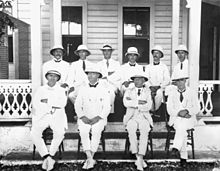Legislative Assembly of Samoa
Legislative Assembly of Samoa Fono | |
|---|---|
 | |
| Type | |
| Type | |
| Structure | |
| Seats | 49 |
 | |
Political groups | HRPP: 36 seats Tautua Samoa: 13 seats Independent: 2 seats |
| Elections | |
| single-seat constituency | |
| Meeting place | |
| Apia | |
| Website | |
| www | |
 |
|---|
| Constitution |
The Legislative Assembly is the Parliament of Samoa based in the capital, Apia, where the country's central administration is situated.
In the Samoan language, the Legislative Assembly of Samoa is sometimes referred to as the Samoan Fono while the government of the country is referred to as the Malo.
The word fono is a Samoan and Polynesian term for councils or meetings great and small and applies to national assemblies and legislatures, as well as local village councils.
The modern government of Samoa exists on a national level alongside the country's fa'amatai indigenous chiefly system of governance and social organisation.[1]
History

The Samoan Fono is descended from the Western Samoa Legislative Assembly established under New Zealand rule in the early 1900s. On the country's political independence in 1962, the 5th Legislative Assembly became the 1st Samoan Parliament.[2]
Members of Parliament
The Samoan Fono has 49 Members of Parliament. 47 members are matai (traditional heads of families), elected in six two-seat and 35 single-seat constituencies. The other 2 Members are elected by, and represent, individual voters, i.e. "Samoan citizens descended from non-Samoans".[3]
Members of Parliament in Samoa are directly elected by universal suffrage, and serve a five-year term.
Head of State
The Head of State or O le Ao o le Malo is elected for a five-year term by the Fono.
Elections
Elections are held under a simple plurality system. Samoan electors are divided into six two-seat and 35 single-seat constituencies. In addition, two seats are reserved for "individual voters", non-indigenous citizens who may not hold a chiefly title or any customary interest in Samoan land.
Electors must be Samoan citizens and aged over 21.[4] Candidates must be qualified as electors, and in addition those for territorial seats must hold a matai title.[5]
Last election results
Template:Samoa legislative election, 2006
Legislative Procedures
This section is empty. You can help by adding to it. (July 2010) |
Other functions
The Fono is responsible for electing the O le Ao o le Malo, the Samoan head of state.
Terms of the Fono
The Fono is currently in its 14th term.
Building
The Fono is housed in a bee-hive shaped building based on the traditional Samoan fale.
See also
- Electoral Constituencies of Samoa
- List of Speakers of the Legislative Assembly of Samoa
- Politics of Samoa
- List of legislatures by country
References
- ^ Fana'afi Le Tagaloa, Aiono (1986). Western Samoa the Sacred Covenant. University of the South Pacific;Institute of Pacific Studies. p. 103. ISBN 982-02-0012-1. Retrieved 2 March 2010.
{{cite book}}:|work=ignored (help) - ^ Parliament of Samoa: general information Archived 2007-06-24 at the Wayback Machine
- ^ "Samoa PM accused of racism over anti-Chinese remark". Radio New Zealand International. 21 January 2005. Retrieved 14 October 2011.
- ^ Electoral Act 1963, s16 Archived 2009-03-06 at the Wayback Machine
- ^ Electoral Act 1963, s5 Archived 2006-10-02 at the Wayback Machine
